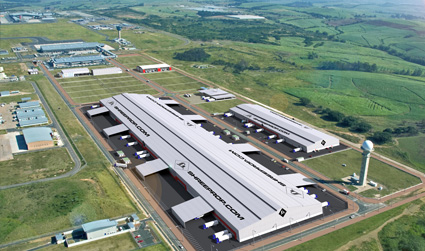
Industrial Land Sales Fly at Dube TradeZoneInterest from local and international listed manufacturing enterprises has driven demand for industrial land at Dube TradePort, with investment topping R1 billion already earmarked for Dube TradeZone Phase one. This was all achieved within the space of 24 months. The greater than expected take-up of land and the extent of Foreign Direct Investment has encouraged the organisation to fast-track its future land releases. Moreover, six months ago there was one crane working at TradeZone Phase one. Now 24 sites are under construction. As an interim measure, an already zoned smaller four-hectare site is being serviced and will be brought to the market towards the end of 2014, while the zoning process for the 183-hectare Dube TradeZone Phase two and Ushukela Precinct (Phase three) has been brought forward by a year. Although the launch of TradeZone Phase two is still a year away, 20 hectares of it has already been reserved for the planned second phase expansion of an international manufacturing facility. “Seven new developments in major industries are setting-up in the TradeZone. We are very pleased that we were able to secure the investment we did. It is a strong indicator of the value of Dube TradePort Corporation’s investment proposition,” says Hamish Erskine, Dube TradePort Corporation’s Property Sales Executive. Manufacturing in the electronics sector, packaging and logistics have been the focus of the latest investments, causing a swing in the approach being taken to the development of Dube TradeZone. A sector clustering approach is underway. This concentrates on encouraging and supporting inter-firm collaboration, institutional development and support in targeted industrial sectors that offer the most local economic development potential. “We are currently investigating the development of an electronics cluster. A number of key electronic investments are coming into the zone and, with the potential of Special Economic Zone status, we are exploring the supplier linkages in this sector across a wide range of businesses, with an emphasis on export and air freight usage,” says Erskine. Within the electronics sector two, 12 000 square metre facilities under roof - with room to expand - have been leased to international companies. One of these is involved in a Joint Venture with a South African company for the manufacture and assembly of components. Adjacent to this, a 25 000 square metre site, with 15 000 square metres under roof, has been taken up by a major European freight forwarding and logistics company on a long lease to a South African developer constructing the warehousing. Two packaging companies have established themselves in Dube TradeZone, providing the possibility for the creation of a packaging and repackaging cluster around this major value-adding sector. Consumer product manufacturing is another opportunity being explored. In 2012 Durban-based, Shree Property Holdings, a property development and logistics business, leased 23 sites, totalling 125 000 square metres in Dube TradeZone Phase one and invested more than R475 million in facilities. It also intends to invest extensively in the second phase. To date Shree Property Holdings has completed a 12 000 square metre logistics warehouse, which will be occupied by the Imperial Group, as well as a 2 500 square metre facility for Rossi. It is also currently in the process of completing a 12 000 square metre manufacturing facility which will be followed shortly by a second similar development. Erskine believes Dube TradeZone’s position close to King Shaka International Airport and Dube Cargo Terminal, combined with potential Special Economic Zone status, makes Dube TradePort the ideal location for companies importing materials for manufacturing and exporting finished products. In spite of the intention to create sector clusters, this does not preclude other suitable businesses from finding a home in Dube TradeZone, as sufficient land is coming on-stream to cater for all-comers in the future. With sold out signs on Dube TradeZone Phase one, Dube TradePort Corporation has turned to bedding-down the zone. “It is important to get a well-functioning precinct going. We are nurturing relationships between existing clients and creating synergies where possible,” says Erskine.
“We want to establish Dube TradeZone as a zone of choice by providing excellent long-term support for our investors,” he says, making it clear that Dube TradePort Corporation should not be regarded as a generalised property developer, but rather an enabler of development.
|
